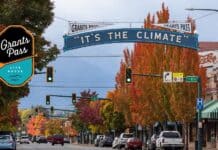*UPDATE: This story was updated on June 10 with results from Sedona’s wastewater testing.
People infected with SARS-CoV- 2, the virus that causes COVID-19, excrete the virus in their waste, so scientists across the country are hopeful that screening wastewater for the virus could give communities an early warning system for new outbreaks.
And as the struggle against COVID-19 begins to look more like a marathon than a sprint, the ability to accurately gauge the presence — or absence — of the virus in the community could be critical to resuming life.
Dr. Crystal Hepp, an evolutionary biologist at Northern Arizona University who specializes in microbe evolution, is testing wastewater across Northern Arizona in an effort to develop wastewater surveillance in the region. In late May, Hepp began testing influent [untreated] and effluent [treated] water from Sedona’s wastewater treatment plant, as well as other local communities, including the Village of Oak Creek.
Sedona’s Director of Wastewater Roxanne Holland said that the city began sending weekly water samples to NAU on May 21, adding that the city receives emailed test results about a week after sending the samples. The testing through NAU is free to the city.
The Sedona wastewater plant previously participated in coronavirus wastewater testing through a company called Biobot Analytics but switched to testing through NAU study when Hepp expanded her work to include more communities in Northern Arizona.
*Sedona has had two positive detections of the novel coronavirus in its untreated wastewater since testing began April 14. Results are reported in genetic copies per liter. Scientists are still studying how to interpret the significance of relative concentrations of virus in wastewater.
The city of Tempe, which has conducted wastewater COVID testing since late March, states in its wastewater reports, that “research has not yet determined the relationship between these genome values and the number of people who are positive for COVID-19 in the community.”
In Sedona, BioBot Analytics detected 19,975 copies of coronavirus genome/liter of in a sample taken April 14 and 5,137 copies/liter in a May 20 sample. All other weekly samples have come back “Non-Detect.” The city is still awaiting results from a May 27 sample.
In a May press release from NAU, Hepp said that testing wastewater for coronavirus offers many benefits as a microbial surveillance tool compared to direct testing of individuals.
“To be sustainable during an outbreak of this magnitude, a more robust, feasible and human-independent method of community sampling needs to be implemented,” Hepp said in the press relase.
Though Hepp’s team is testing both treated and untreated wastewater, the release noted that Hepp had so far not detected the novel coronavirus in treated wastewater, suggesting that treatment processes are effective in clearing the virus.
Besides detection alone, Hepp is also looking for specific strains of the novel coronavirus in regional wastewater, information that could provide a clearer picture of the virus’ spread in Northern Arizona.
“The virus is always evolving,” Hepp said in the press release. “There are always new strains that could be arising. If we find several different strains with different mutations, that would indicate the virus has had more of a chance to mutate over time within the population or that new introductions have occurred.
“A higher number of strains at any given time may indicate more infected individuals.”
Prior to the coronavirus outbreak, Hepp was studying the spread of the West Nile virus in Arizona.
Data from the Sedona wastewater samples is below.
| Sample Date | BioBot Analytics Influent Results (copies/L) | NAU Influent Results (copies/L) | NAU Effluent Results (copies/L) |
| 4/14/2020 | 19,975 | ||
| 4/21/2020 | Non-Detect | ||
| 4/29/2020 | Non-Detect | ||
| 5/5/2020 | Non-Detect | ||
| 5/12/2020 | Non-Detect | ||
| 5/20/2020 | 5,137 | Non-Detect | Non-Detect |
| 5/27/2020 | Non-Detect | Non-Detect |






















